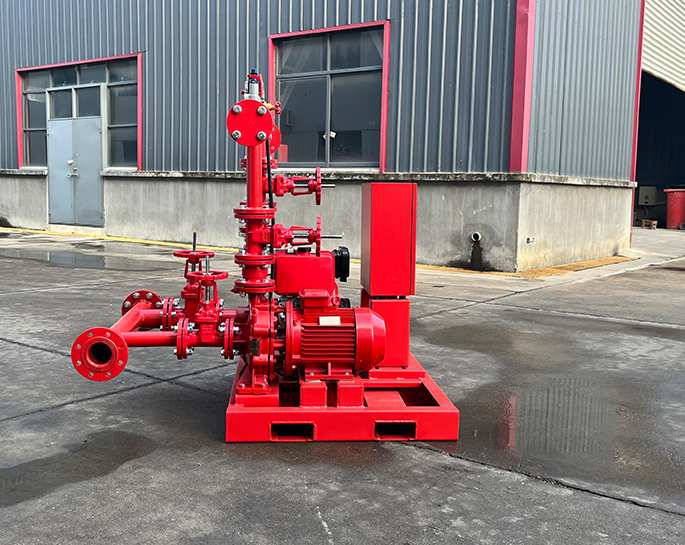What role does water quality testing play in ensuring the effectiveness of fire pump systems?
Feb 05, 2024
Share:
Water quality testing plays a crucial role in ensuring the effectiveness of fire pump systems. Fire pump systems are designed to provide a reliable and sufficient water supply for firefighting in the event of an emergency. The quality of the water used by these systems directly impacts their performance and longevity. Here are some key reasons why water quality testing is important:
1. **Corrosion Prevention:** Water with high levels of corrosive elements can damage the pump and piping components over time. Regular water quality testing helps identify corrosive elements like salts and minerals, allowing for the implementation of corrosion prevention measures.
2. **Cavitation Prevention:** Cavitation occurs when the water contains air or gases, leading to the formation of bubbles that collapse with force against pump components. Water quality testing can detect dissolved gases and air content, helping prevent cavitation and potential damage to the pump.
3. **Scale Formation Prevention:** Hard water, which contains high levels of minerals like calcium and magnesium, can lead to scale formation on pump components. Scaling can reduce the efficiency of the pump and obstruct water flow. Water quality testing helps monitor mineral levels and implement measures to prevent scaling.
4. **Microbiological Contamination:** Water quality testing is crucial for identifying the presence of harmful bacteria, algae, or other microorganisms. Microbial contamination can lead to clogging, fouling, and deterioration of pump components, affecting the system's overall effectiveness.
5. **Reliability and Performance:** Ensuring that the water supplied to the fire pump system meets quality standards is essential for the system's overall reliability and performance. Poor water quality can lead to reduced efficiency, increased maintenance requirements, and potential system failures during firefighting emergencies.
6. **Compliance with Standards:** Water quality standards and guidelines are often set by regulatory bodies or industry standards organizations. Regular testing helps ensure that the fire pump system complies with these standards, which is essential for meeting safety and legal requirements.
7. **Maintenance Planning:** By understanding the water quality, maintenance schedules can be adjusted accordingly. For example, if corrosion is detected, more frequent inspections and protective measures may be necessary.
In summary, water quality testing is a preventive measure that helps maintain the reliability and effectiveness of fire pump systems. It allows for the early detection of potential issues, enabling appropriate corrective actions to be taken to ensure the system functions optimally when needed during firefighting emergencies.

1. **Corrosion Prevention:** Water with high levels of corrosive elements can damage the pump and piping components over time. Regular water quality testing helps identify corrosive elements like salts and minerals, allowing for the implementation of corrosion prevention measures.
2. **Cavitation Prevention:** Cavitation occurs when the water contains air or gases, leading to the formation of bubbles that collapse with force against pump components. Water quality testing can detect dissolved gases and air content, helping prevent cavitation and potential damage to the pump.
3. **Scale Formation Prevention:** Hard water, which contains high levels of minerals like calcium and magnesium, can lead to scale formation on pump components. Scaling can reduce the efficiency of the pump and obstruct water flow. Water quality testing helps monitor mineral levels and implement measures to prevent scaling.
4. **Microbiological Contamination:** Water quality testing is crucial for identifying the presence of harmful bacteria, algae, or other microorganisms. Microbial contamination can lead to clogging, fouling, and deterioration of pump components, affecting the system's overall effectiveness.
5. **Reliability and Performance:** Ensuring that the water supplied to the fire pump system meets quality standards is essential for the system's overall reliability and performance. Poor water quality can lead to reduced efficiency, increased maintenance requirements, and potential system failures during firefighting emergencies.
6. **Compliance with Standards:** Water quality standards and guidelines are often set by regulatory bodies or industry standards organizations. Regular testing helps ensure that the fire pump system complies with these standards, which is essential for meeting safety and legal requirements.
7. **Maintenance Planning:** By understanding the water quality, maintenance schedules can be adjusted accordingly. For example, if corrosion is detected, more frequent inspections and protective measures may be necessary.
In summary, water quality testing is a preventive measure that helps maintain the reliability and effectiveness of fire pump systems. It allows for the early detection of potential issues, enabling appropriate corrective actions to be taken to ensure the system functions optimally when needed during firefighting emergencies.


.png)
.png)

.png)


